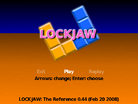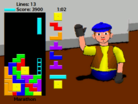Lockjaw
| LOCKJAW | |
|---|---|
| Developer(s) | Damian Yerrick |
| Platform(s) | Allegro (binaries exist for Windows and Mac, and source compiles on Linux) Game Boy Advance Nintendo DS |
| Release | 2006 |
| Latest release | Version 0.46a (9 November 2008) |
| Gameplay info | |
| Next pieces | 1 to 8 |
| Playfield size | Selectable; default 10w x 24h with 20h ceiling |
| Hold piece | Yes, with IHS |
| Hard drop | Yes, both "firm" and "hard" variants |
| Rotation system | Selectable: SRS, ARS, others |
Lockjaw was a highly customizable open-source Tetris fan game first released in 2006. The overall idea of its customizability was inspired by one of Henk Rogers' interviews. Lockjaw's customizability allowed it to simulate other tetromino games such as Tetris The Grand Master series and Tetris DS.
The game was removed from distribution in 2012 as part of the developer's response to the court case of The Tetris Company vs. Xio.
Customization
Lockjaw is customizable, allowing the player to change the theme, background, sounds, and music. In addition, the options menu has settings for DAS, ARR, line/lock delay, and others which can be changed. Players have created lists of option values that simulate well-known games. A list of simulation settings can be found here.
Satire
Although Lockjaw is developed to appease Tetris fans, it also satirizes the current state of the game. The original set of planned modes, meant to poke fun at Tetris DS, included:
- Dual Marathon - The keys control both a platform game (in the top window) and standard singleplayer tetris (in the bottom screen). When losing on any of these games, the game ends.
- Ridin' Spinners - This mode exhibits standard singleplayer Tetris gameplay. However, if you abuse lock delay or if you perform a T-Spin Triple twist, the music changes to "Ridin' Spinners" by Three 6 Mafia for a few seconds, and the screen spins (as in Lockjaw: The Overdose).
- Low Rider - The visible playfield is 8 rows tall. Implemented, as "Well height" option.
- Vs. - In Vs. mode, when you receive an I tetromino (after the first), you also receive four lines of garbage. Implemented, as "Garbage" option.
- Items - 3/4 of the time you start the mode, it will play annoying music for 2 minutes, give an 86420 error, and quit. The rest of the time, it will play annoying music between 15 seconds and 2 minutes and then behave like standard single player Tetris. However, you will recieve random starting orientations, no rotation, and hidden next pieces. The speed starts at 1G. Every time you are given an I piece, you will either receive four lines of garbage or be the target of a banana item. Implemented partially.
- Beyond Level 20 - The music starts slow, 60 beats per minute. On every beat, the tetromino hard drops. Every time you clear 30 lines, the music speeds up by 10 BPM. Implemented, as "Rhythm" speed curve.
Timing
Since version 0.01, Lockjaw has been factory-set to its own speed curve, called "Exponential". Versions 0.01 through 0.44 behave as follows, if n pieces have come out:
| Number of pieces | Gravity | Lock delay |
|---|---|---|
| 0 ≤ n < 609 | 1/60G * (259/256)^n | 40 frames |
| n ≥ 609 | 20G | 40/(1 + 3/256 * (n - 609)) frames |
Version 0.45 changed Exponential to remove the repeated multiplication by 259/256. Instead, it approximates the curve as a stepwise function over 30-piece sections, doubling gravity precisely every 60 pieces.
In addition, Lockjaw can emulate a few other games' speed curves, controlling ARE, gravity, DAS delay, lock delay, and line clear delay.
Scoring
Since version 0.01, Lockjaw has been factory-set to its own scoring system. It involves computing the garbage like Tetris DS Standard VS. does, then awarding 100 points for each line clear and 200 for each row of garbage.
- Single: 100 (1L)
- Double: 400 (2L + 1G)
- Triple: 700 (3L + 2G)
- Home run (Quadruple): 1200 (4L + 4G)
- T-spin: 500 (1L + 2G) per line
- Back-to-back home run or T-spin: 200 (1G) more
(A "home run" is four lines cleared with one piece, called a "Tetris" in products of The Tetris Company. A line clear is "back-to-back" if the line clear before it was a home-run or a T-spin.)
In addition, Lockjaw can emulate a few other games' scoring formulas.
See also
External links
- Home page (download no longer available)
- Development thread
| |||||||||||

